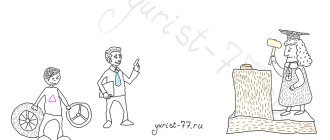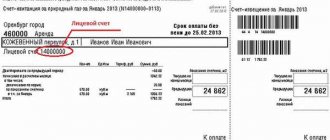A little theory or what an STD is
The Law “On the Protection of Consumer Rights” (CRP) regulates the legal relationship between the seller and the consumer.
Seller is an organization or individual entrepreneur that sells products, provides services, and performs work. The law also applies to online stores. It is important that the company or entrepreneur is officially registered. It will not be possible to present legal demands to the grandmother who sold you sour milk at the market “patch” near your house, or to the private owner who erected a crooked fence.
Buyer is an individual who purchases goods/services for himself or his family. Goods used by the buyer in a business are not covered by the provisions of the PPA.
Technically complex products
Such goods include vehicles, electronics, household appliances, radio equipment, photographic and film equipment, watches and other technically complex goods.
The peculiarities of the sale of such goods come down to the fact that their exchange and return are possible only if the item has significant shortcomings that prevent its use, or the buyer is not provided with complete information about the product, including operating instructions written in Russian.
If the quality of a technically complex product is adequate, it can be returned to the seller within 14 days on the basis of Article 25 of the Federal Law “On the Protection of Consumer Rights”.
If the buyer discovers defects in a technically complex product within 15 days, you should contact the seller with a corresponding claim (Sample claim requesting termination of the sales contract and return the cost of the phone).
A similar procedure for protecting your rights - sending a claim to the seller - is also applicable if the 15-day period has expired. In this case, a claim can be submitted if the seller violated the repair deadlines, the product has significant defects, and it is impossible to use the item for more than 30 days of each year of the warranty period (Sample claim for return of a car).
It should be noted that the repair period for technically complex goods is 45 days. At the same time, during this procedure, the buyer must be provided with an equivalent replacement for the technically complex product transferred for repair.
Another significant point is that delivery costs for repair, replacement, evaluation, markdown of large items and goods heavier than 5 kilograms are borne by the seller. In such cases, the seller has no right to demand reimbursement of transportation costs from the buyer.
In case of refusal to consider the claim, the buyer whose rights have been violated also has the right to file a corresponding statement of claim in court (Sample statement of claim for compensation for damage and payment of a penalty for goods of inadequate quality).
What you need to know about your rights
By offering the buyer a low-quality product or performing work with defects, the organization violates consumer rights. The law provides for liability for such actions.
Your civil rights are violated if:
- the product sold turned out to be faulty, the service provided does not meet quality requirements, but the seller or service provider does not think so and does not take any steps to meet you;
- the item does not fit in size, does not suit the style, but the seller does not accept your legal refusal of the goods, does not want to make a replacement or return the money;
- the product you purchased was stored in violation of sanitary standards, in inappropriate conditions, which caused health problems;
- You were sold expired products.
Not everyone knows that selling goods without a receipt is not only a gross violation of trade rules, but also infringes on the buyer’s civil rights. Rude treatment and rudeness on the part of the seller is also a violation of consumer rights.
The buyer is obliged to receive a quality product and decent service. Do not be afraid to demand compensation for property or moral damage - on your own or with the help of a lawyer.
Consumer rights
A feature of the Russian Federation Law “On the Protection of Consumer Rights” is that it is designed primarily for the fact that individual consumers must protect their rights independently (or with the help of consumer societies) and only in the case when the parties (for example, buyer - seller) do not came to mutual agreement, local authorities, federal executive authorities, the prosecutor's office, and the court are involved in the protection of consumer rights. Given the existing scale of the consumer market, this order is the most acceptable. In order for the voluntary procedure for satisfying consumer demands to be effective, so that business entities are focused on agreement with consumers, the latter must learn to independently defend their rights. To do this, first of all, when purchasing a product (work, service), take a sales or cash register receipt, a receipt, a ticket - a document indicating that you are a buyer, customer, client, passenger, i.e. you are in a contractual relationship with the seller ( manufacturer, performer). Such a document must be issued to you by enterprises of any organizational and legal form, individuals engaged in business without forming a legal entity. If they don’t give it, don’t buy goods from them, submit an application to the administrative authorities or the Internal Affairs Directorate - this is a gross violation of the rules of trade and public service. Send a claim to the seller (manufacturer, consumer). The complaint should indicate in detail:
- To whose address it was presented, the name and address of the enterprise, person.
- Your exact postal address, last name, first name, patronymic, telephone.
- The subject of the relationship between you and the violators of your rights is a product, work, service that was sold in violation of consumer rights (name, quantity, quality, moment of sale).
- The essence of the violation (quality, safety, inappropriate information, violation of schedule, deadlines, etc.).
- Consumer requirements:
- fulfillment of the terms of the contract;
- payment of penalties;
- compensation for damage, harm;
- the period during which the violator must eliminate the violation free of charge. All this with reference to specific articles of the Law of the Russian Federation “On the Protection of Consumer Rights”, indicating specific material assets, works, services, calendar dates, amounts of money for which you are applying.
- An indication that if the seller (manufacturer, performer) does not voluntarily satisfy your requirements, you will be forced to file a claim in court (according to Article 17 of the Law of the Russian Federation “On the Protection of Consumer Rights”, for such claims you are exempt from paying state duty ). In your statement of claim, in addition to satisfying the listed requirements, you will seek compensation for moral damage; in addition, the court, for refusing to voluntarily satisfy your demands, has the right to fine the seller (manufacturer, performer) in the amount of the claim, thereby doubling its losses.
- Number, signature.
The claim must be made in two copies. One - keep it for yourself and save it. Make sure that your claim is registered by the recipient in the incoming document log, or send it by registered mail with notification, and save the receipt. As a rule, a correctly drafted and officially sent claim to the violator turns out to be more effective than oral appeals, even the most emotional ones. The reason for the effectiveness of claims is that, firstly, the seller immediately receives an official document to which he is obliged to respond; secondly, the seller, after reading the document, is convinced that the consumer has knowledge of the law and is determined to put this knowledge into practice, defending his rights. A seller with common sense, who realizes that he has really violated consumer legislation and who understands that the consumer is right, will not persist, but will try to resolve the conflict situation and reach an agreement with the buyer. Therefore, the parties come to an agreement voluntarily in most cases. It should be remembered that this procedure is mandatory for some categories of consumer disputes. It is mandatory to file a claim before filing a lawsuit:
- in case of non-fulfillment or improper fulfillment of obligations in the provision of communication services or performance of work in the field of communication;
- in case of non-fulfillment or improper fulfillment of obligations arising from the contract for the carriage of passengers, their luggage and cargo:
- when transported by sea;
- when transported by rail;
- when transported by air;
- when transported by inland water transport;
- when transported by road.
- in case of non-fulfillment or improper fulfillment of obligations in the provision of tourist services.
According to the current legislation, only if this claim procedure is observed for the specified categories of disputes and if agreement is not reached with the contractor, the consumer has the right to seek protection from government agencies, including the court.
The number of executive authorities exercising state control over compliance with legislation and regulating relations in the field of consumer rights protection includes the federal antimonopoly body (its territorial bodies) - the State Committee for Administrative Offenses of the Russian Federation (TO), as well as federal executive authorities (their territorial bodies) control over the quality and safety of goods (works, services) - standardization, metrology and certification; protection of the environment and natural resources and sanitary and epidemiological supervision. In contrast to the latter, the State Customs Code of the Russian Federation (TO) is more focused on protecting consumer rights from inappropriate information, as well as in matters relating to service life, shelf life, warranty, and fulfillment of consumer requirements. SSAC RF (TO) does not have a laboratory and analytical base and does not have experts on its staff. Therefore, he can deal with issues of protecting the rights of consumers to the quality and safety of goods (work, services) only if he has the appropriate expert opinions. The form of citizens' appeal to the federal executive authorities is an application. It is drawn up in any form, but must include information: - about whose address it is sent to; — about the applicant (last name, first name, patronymic, detailed address, telephone); — the essence of relations with an economic entity; — organizational and legal form, name and address of this entity; - what the applicant saw as a violation of his rights; - how his rights should be restored, what the consumer demands from the violator of his rights; — a request for assistance in protecting your rights; — a list of attached documents indicating the number of pages; - number and signature. Consumers submit evidence of violations of their rights to the bodies of the State Committee on Arbitration of the Russian Federation. This is one of the most important aspects of successful work to protect consumer rights. The application, along with evidence, must be accompanied by documents confirming the existence of a contractual relationship with the business entity (check, receipt, ticket, coupon, agreement, etc.).
The proposed form of citizens’ appeal (application + documents) is also correct when applying to local government bodies, internal affairs bodies, and the prosecutor’s office. We advise consumers to check the registration of submitted applications. Applications must be reviewed within 10 days from the date of registration. Based on the results of the consideration, the relevant authorities provide an official response in writing. Try to get this answer. In case of refusal, file a complaint with a higher authority. In cases where a violation of consumer rights is established, federal authorities may apply the following measures to violators. The State Customs Committee of the Russian Federation (TO) sends orders to stop violations of consumer rights, including to stop the sale of goods with an expired shelf life, goods for which expiration or service dates should be established, but have not been established, to suspend the sale of goods (performance of work, provision of services) in the absence of adequate information about them. Federal executive authorities and their local divisions (SEN, Gosstandart, Goskompriroda, etc.) monitor compliance with the requirements for the safety and quality of goods (work, services), send instructions to violators: to eliminate violations of the requirements for the safety of goods (work, services) ), on discontinuation of such products, termination of their production and sale, termination of the sale of goods (work, services) for which expiration dates or service life should be established, but are not established, on suspension of the sale of goods (performance of work, provision of services) in the absence of proper information about them, recalling them from consumers and informing consumers about this. These bodies, within their competence, establish mandatory requirements for the safety of goods (works, services) and monitor their compliance. For evasion of execution of orders or their untimely execution, federal executive authorities have the right to impose a fine on violators in the amount of up to five thousand minimum wages. Of course, the actual amount of fines in each specific case is determined not by an upper limit, but by taking into account the amount of damage caused, the capabilities of enterprises, etc. In addition, the authorities exercising control over the safety and quality of goods (work, services) have the right to impose a fine in cases of: - damage to consumers caused by dangerous goods (work, services) up to 5 thousand minimum wages; — sales of goods (work, services), including imported ones, without certificates of conformity in the amount of the cost of goods (work, services) sold; — violation of the rules of mandatory certification by certification bodies, as well as the provision of false results of examination of goods (work, services) by laboratories (centers) of mandatory certification in the amount of twice the cost of the relevant goods (work, services). With the exception of fines for an individual entrepreneur, all fines are collected without acceptance (indisputable) within thirty days from the date of the relevant decisions on their collection. The size of the fine and the method of its collection are such that, without a doubt, they can be characterized as very effective measures to protect the interests of consumers. At the same time, in cases where damage to the consumer has not yet been caused, the federal authorities do not immediately fine, but first order to stop the violations, determine what they are, the deadlines for termination, and only in case of failure to comply with the instructions, impose fines. In addition, fines are fully transferred to the federal budget, which means that the State Capture Commission of the Russian Federation (TO) and other federal executive authorities are not financially interested in fining as many business entities as possible for the largest possible amount. A fine in this case is an extreme measure applied to persistent violators. As for individual entrepreneurs, the procedure for imposing fines on them differs only in that if they fail to pay fines on time and in full, the federal authorities (SCAP RF (TO), bodies exercising control over the quality and safety of goods) will collect fines, as well as a penalty of one percent per day for each day of delay in paying the fine by applying to the arbitration court. One of the reasons for this procedure is that the majority of individual entrepreneurs do not have current accounts in banks, and therefore a direct procedure for collecting fines is impossible here. However, suspension or revocation of licenses and initiation of criminal cases serve as effective measures of influence on individual entrepreneurs who violate consumer protection laws.
What to expect in case of violation of consumer rights
An unscrupulous party, having violated your rights, has the opportunity to voluntarily satisfy the claims by offering a choice of:
- exchange low-quality goods;
- reduce the cost of the defective purchase proportionately;
- eliminate deficiencies at your own expense;
- compensate your costs for independently eliminating product defects;
- compensate for losses caused by the sale of low-quality goods;
- terminate the contractual relationship and return the money.
If you have lost your receipt, do not worry - your claims will still be considered.
In a situation where it is difficult to confirm the fact of purchase, you will have to turn to witnesses for help.






